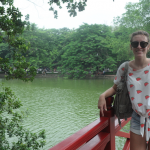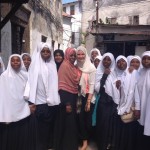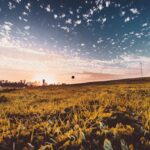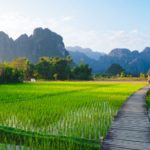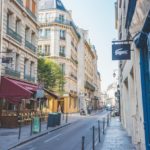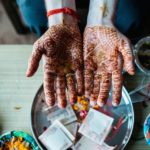Beyond The Iron Curtain
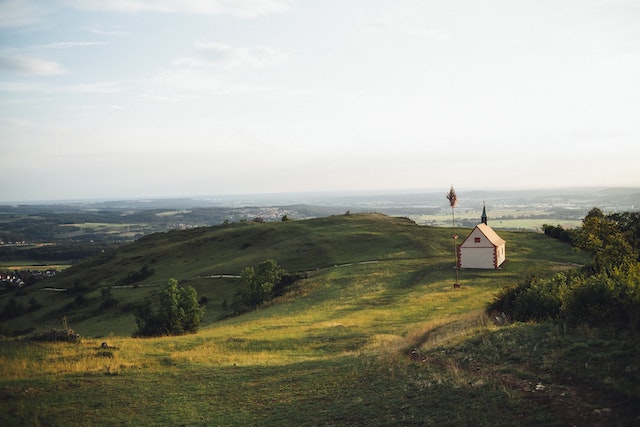
“Wait here.”
My brother and I were commanded as we were led into a windowless, empty room approximately 10 by 8 feet, lit by 2 low-wattage light bulbs with no shades hanging from the ceiling. The guards closed the door and left us to our own devices.
There was just one faded framed photo of Krushchev hanging on the otherwise blank walls. The floor was vinyl, that fake wood type of pattern so common in the fifties. It needed scrubbing.
We looked at each other.
“What next?””
They had taken our passports. We thought we were going to visit Berlin which, at the time, was still in East Germany so we had to cross the border from West Germany. We traveled in France, West Germany, Switzerland and Austria so far, with stamps in our passports at each border witnessing our journey. And we filled the car with petrol earlier that day, knowing it was pricier behind “the Iron Curtain.” We were only just beginning to realize what the term meant.
We were only just beginning to realize what the term meant.
We reminisced about our adventures in the 3 weeks since leaving London with Mummy’s little car to camp around Europe.
We had visited Eva, who had been employed by our next-door neighbors in Stanmore, a suburb of London, to look after their 2 young children. She had a nice room in their house, but when she was not needed to baby-sit or to do housework, she was expected to remain in her room except for meals. With 3 teenagers in our home, Eva was welcome to join us whenever she was free from her duties. She shared our lives for the year, learning most of her English from us. Eva had returned to her family in Graz, in the Austrian Alps where Roger and I were welcomed warmly in their lovely wooden chalet.
We remembered the night we camped at Fussensee, in Bavaria, on the Austrian border. We were setting up our pup tent as another family nearby were setting up their larger tent. They seemed to be watching us. The father was building a fire and soon, the daughter, about my age, came over and invited us to join them for supper. We were conversing in my limited German and their minimal English with a lot of help from our hands. The mother asked me is a confidential tone,
“You married?”
“You married?”
She pointed to Roger and me and then her 4th left-hand finger where she noticed I was not wearing a ring.
I laughed and shook my head.
“No” I exclaimed, “He is my brother. We are camping around Europe together.”
Her response was hilarious. She shook her head, enlightened.
“We thought not. Too cold.”
We talked about the night in Strasbourg when we camped by the river. It was hot and humid. There was no flat site to pitch our tent because they had had heavy rains, the river had overflowed its banks leaving pools of water everywhere. Mosquito heaven. I have always been highly allergic to mosquito bites. Trying to sleep on a 30% slope was not fun, but worse was to come.
When daylight arrived my eyelids were so swollen I could not open them. I had bites in other places but my face was most affected because it had remained outside my sleeping bag. My hand was also swollen because I kept exposing it trying to swot the mosquitos when I heard that evil buzzing near my ears. Roger made breakfast and packed up our tent alone. Once we parked in the city, he steered me by my elbow while he described the interesting buildings in vivid detail, telling me about the history. Strasbourg, in Alsace, was transferred between the French and Germans repeatedly over the centuries and the architecture was influenced by both cultures. I visited Strasbourg nearly 50 years later and it all seemed deja-vu – I still remembered Roger’s descriptions.
At this point 3 border guards burst into the room in their high black leather boots and shiny brass buttons on their khaki uniforms.
At this point 3 border guards burst into the room in their high black leather boots and shiny brass buttons on their khaki uniforms. I half expected them to click their heels and march like the Nazis. We stood up as they proceeded to bring in the contents of our car which they spread out on the large table.
They opened the tent and seemed satisfied we were not using it to smuggle anything. Our toothbrushes, other toiletries, underwear, pots, pans, camp stove as well as all our clothes, sleeping bags and books were unloaded in a heap, but the item which caught their imagination was the soft toilet tissue.
We had understood many places in Europe in 1959 were using shiny sheets of “Jeyes” toilet paper so we had brought enough soft tissue for the 2 of us for the month. The guards had obviously never seen anything like it. They didn’t ask what it was for, and if they had may not have got an answer, since their English seemed limited to “Wait here” or “No touch,” and my German was inadequate to explain.
They kept unravelling it and holding each sheet up to the bare light bulb to see if there were secret messages written on it.
They kept unravelling it and holding each sheet up to the bare light bulb to see if there were secret messages written on it. Or so we thought. We couldn’t think of any other reason for inspecting it as they did. Eventually, with at least 3 rolls totally unravelled on top of the rest of our possessions, one of them went out and returned with our passports and indicated we could take our belongings back to the car and cross the border.
It took us several trips to return everything during which we remained silent for fear they would stop us. We had plenty to say once we were on the road to Berlin, Roger driving and me patiently rewrapping the toilet tissue. We were acutely aware that we needed to be careful for the next few days whenever we were in Soviet-controlled East Germany, including East Berlin.

